
“Dominican Republic 2012” by Schmidt Photography is licensed under CC BY-NC-SA 2.0.
The COVID-19 pandemic has brought about many challenges for the Caribbean region, which relies heavily on a flourishing tourism industry. Countries have had to focus on reinventing and rebuilding their economies in order to push back against rising unemployment, poverty, and food insecurity. This effort has included technological innovation and online connectivity as keys to expanding economic opportunity and investment in long-term capacity building across the region, especially with regards to future health or environmental crises. In the Caribbean region, women have been severely affected by the COVID-19 pandemic, which has led to government programs that focus on mental health, domestic violence prevention, and educational programs to help mothers struggling with online schooling. Additionally, elections have been taking place across the Caribbean region, with many countries experiencing an upheaval of traditional campaigning and election processes, prompting countries to devise new protocols for in-person voting and campaigning consistent with health standards and social-distancing regulations. Despite the many challenges that have rocked these countries, the Caribbean people have nevertheless persevered and shown incredible resilience, exemplifying their commitment to rebuilding through donation programs and community efforts to combat food shortages.
Jump to key trends for each rubric:
Key trends for Governance and the Rule of Law
The significant challenges posed by COVID-19 have reinforced the importance of investment in long-term capacity building across the region, especially with regards to future health or environmental crises.
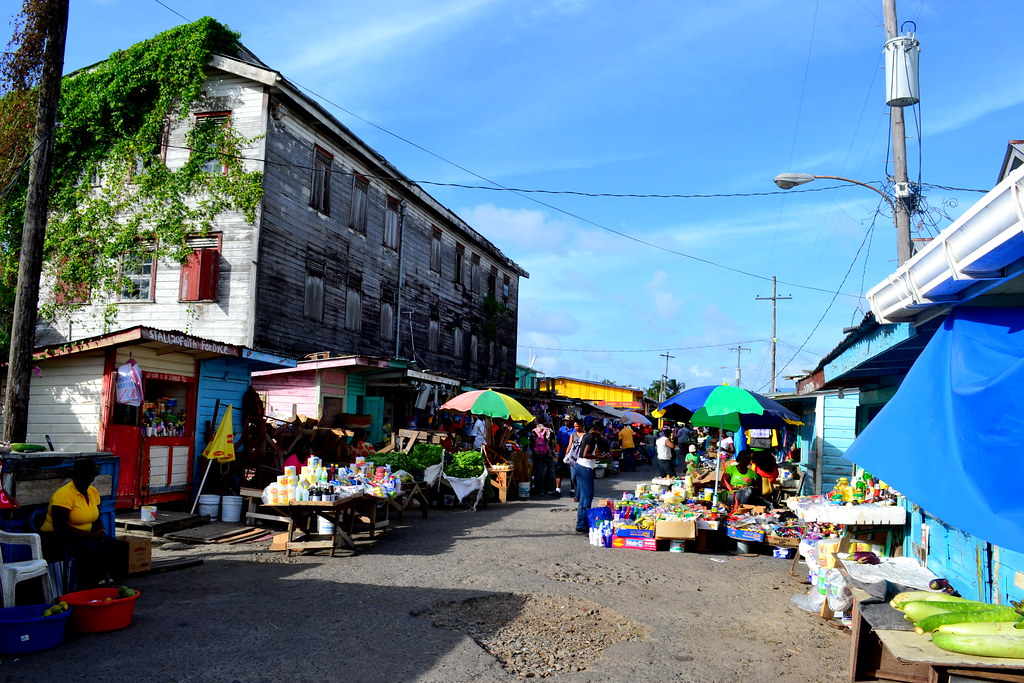
Social protection programs
As the Caribbean confronts the economic crises brought about by COVID-19, government-administered social protection programs have emerged as critical tools in addressing the immediate needs of vulnerable populations and developing economic resilience. Though social protection programs have varied in form and degree, many countries have turned to food and rent assistance programs, unemployment benefits, emergency funds, and cash transfers to address the needs of their populations. Such programs have been vital in the region, as the economies of the Caribbean and CARICOM member nations are heavily-concentrated in the tourism, agriculture, and energy sectors. Workers in especially impacted industries as well as vulnerable populations, including those in poverty, families with young children, the elderly, and people with disabilities, have been targeted in these efforts. As the economic crisis continues, however, funding for social protection programs has dwindled, raising concerns about the longevity of these programs and leaving urgent needs unaddressed.
An informal street market in Georgetown, Guyana. “Guyana” by John+Elaine Chesterton is licensed under CC BY-SA 2.0.
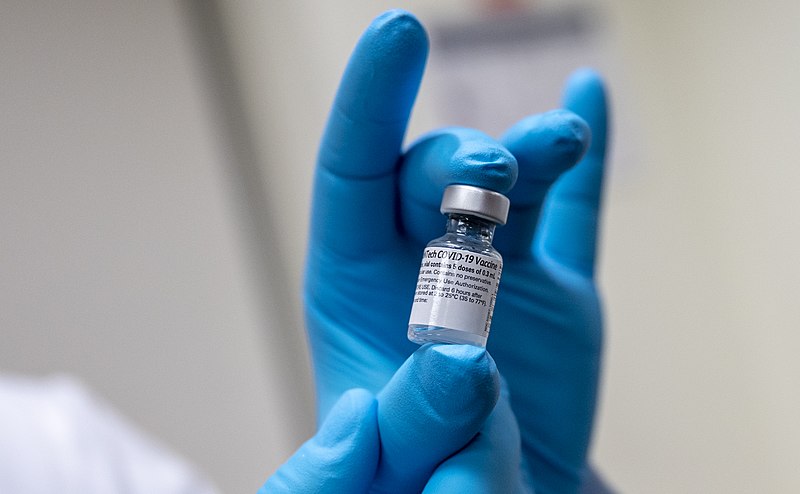
Vaccinations
Vaccine rollouts have begun throughout the Caribbean region. Thus far, vaccine administration has been characterized by regional and global cooperation. This includes the hundreds of thousands of vaccines donated by India to countries such as Barbados and Dominica, as well as donations between CARICOM members. However, many small countries have had trouble obtaining the vaccine and are still waiting to receive doses from the COVID-19 Vaccines Global Access program, commonly known as COVAX. As vaccines increase globally, particularly in wealthy nations, tourism-dependent countries are largely gearing up for a return to travel. While countries still have varying approaches to travel, Belize’s decision to allow any fully vaccinated traveler to enter the country without any additional safety measures could be an indication of the future of travel protocols.
Countries in the Caribbean are beginning to access the COVID-19 vaccine, largely through vaccine diplomacy efforts and their participation in the COVID-19 Vaccine Global Access Facility. “Army Spc. Angel Laureano holds a vial of the COVID-19 vaccine, Walter Reed National Military Medical Center, Bethesda, Md., Dec. 14, 2020. (DoD photo by Lisa Ferdinando) by US Secretary of Defense is licensed under CC BY 2.0.
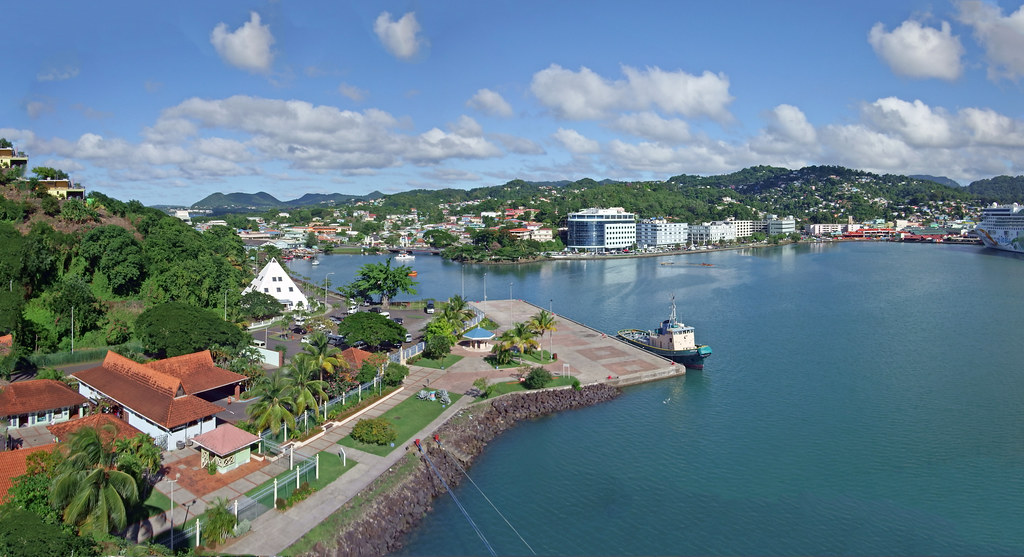
Opportunities Amidst Challenges: Resilience and capacity-building
The significant challenges posed by COVID-19 have reinforced the importance of investment in long-term capacity building across the region, especially with regards to future health or environmental crises. Though all countries in the region are facing significant economic decline, some countries have found opportunities for progress through government-led capacity building projects that both stimulate the economy and help establish future crisis response frameworks and adaptations. Two especially notable projects include Saint Lucia’s plan for Economic Recovery and Resilience and the Barbados Employment and Sustainable Transformation (BEST) program. Saint Lucia’s Economic Recovery and Resilience plan combines economic stimulus with investments in the infrastructure necessary to address future health and climate crises. Barbados’ BEST program provides relief to employees in the tourism sector while also promoting environmentally-friendly practices. These initiatives, among others in the region, have reframed challenges as opportunities for growth and sustainable development.
Saint Lucia is investing in capacity-building to respond to future health and climate challenges as part of its Economic Recovery and Resilience plan. “Castries st Lucia Fuji XP210. DSCF8188-8189.” by Robert.Pittman is licensed under CC BY-ND 2.0.
Key trends for Growth and Innovation
Countries across the Caribbean are grappling with the challenge of reopening their borders and restimulating their tourism industries while also protecting public health.
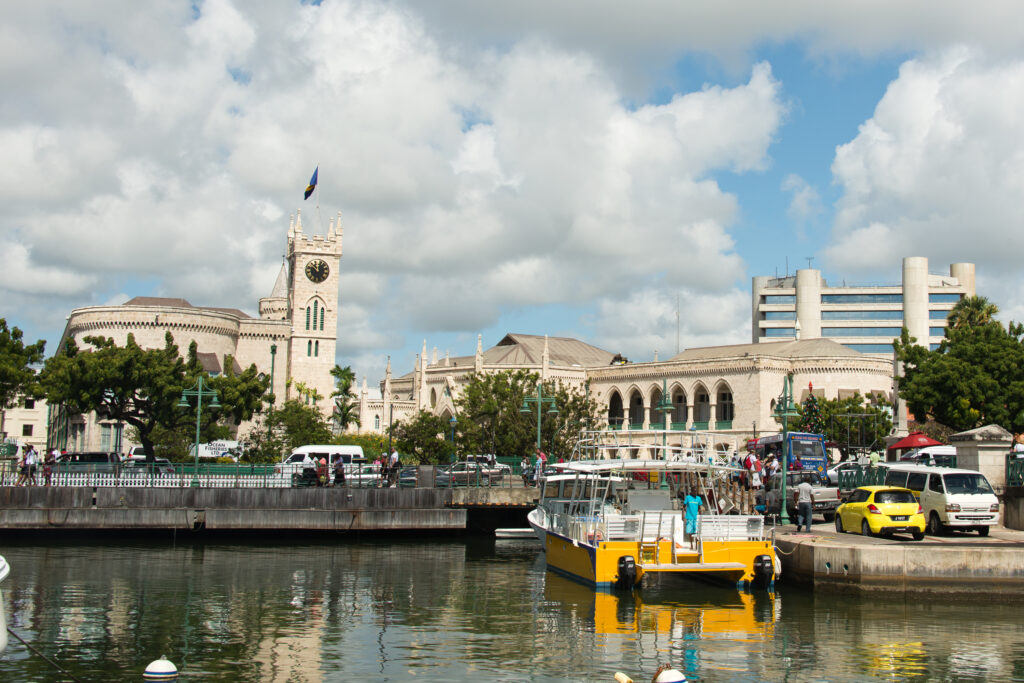
Economic crises and the Start of a Recovery
While the Caribbean as a region has thus far remained comparatively shielded from the health implications of COVID-19, it found itself in a devastating economic crisis. The prolonged effects of the crisis compounded already existing economic difficulties, with countries across the region facing declines in the gross domestic product (GDP), increasing debt, lower revenues, and budgeting difficulties. The Caribbean was especially impacted due to its largely tourism-dependent economy, although the energy and natural resource sectors in countries like Suriname and Trinidad and Tobago have also suffered. This crisis also threatens years of progress in combating poverty and income inequality across the region. However, as borders began to reopen, and the tourism industry began to rebound, due to the newly increasing vaccination rates, countries have seen rapid economic growth as well as inflation. This is also due to new foreign aid from nations like the United States who want to invest in the growing energy sectors of the Caribbean. It is uncertain whether this growth will maintain or if the new cases of Omicron will cause another drop in the economy.
The Parliament and Central Bank of Barbados in the country’s capital, Bridgetown. “File:Barbados Parliament and Central Bank.jpg” by Barry haynes is licensed under CC BY-SA 4.0.
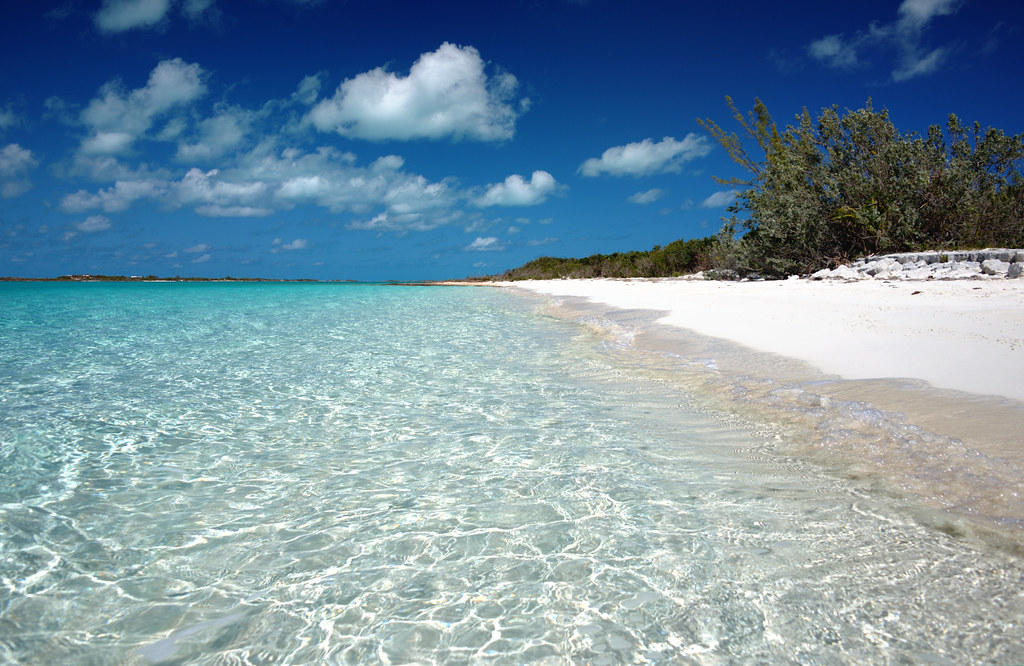
Rebuilding the tourism sector
Countries across the Caribbean are grappling with the challenge of restimulating their tourism industries while also protecting public health. Tourism has emerged as a defining element of government reopening policies. Almost all countries in the Caribbean have partially or fully reopened thus far. Each country has defined its own protocols for reopening and welcoming tourists, and governments have invested in keeping hotels and the travel industry afloat. Recently, almost all Caribbean countries have substantially eased their COVID-19 restriction for tourists to attract a larger quantity and bolster tourism growth as vaccination rates keep increasing. Countries and regional organizations have also launched marketing and public relations campaigns to encourage tourism, including the Dominican Republic’s Marca País and the Caribbean Tourism Organization’s Caribbean Awaits campaign. Regional coordination through organizations like CARICOM has also played a major role in preparing for a revitalization of the tourism sector. Despite these efforts and the substantive growth in tourists after the easing of restrictions, it is unknown if the tourism sector will fully recover as quickly as we might expect due to the rise of COVID-19 variants, such as Omicron.
Beaches across the region, like this one in the Bahamas, remain relatively empty due to tourism and social-distancing regulations. “Bahamas Beach” by jbylund is licensed under CC BY-SA 2.0.
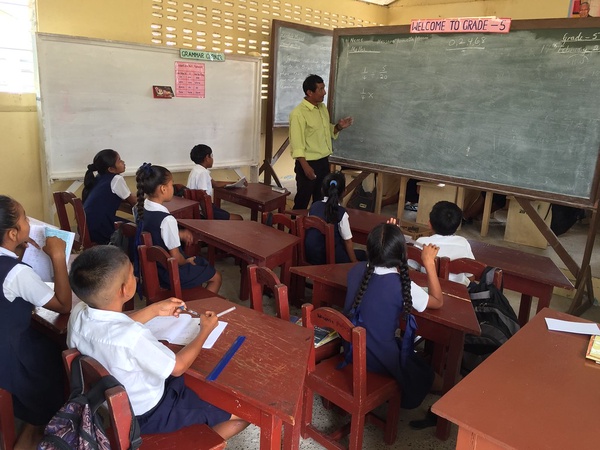
Technological innovation and broadband access
Technological innovation and online connectivity have emerged as key to expanding economic opportunity in the Caribbean. Many countries have highly-concentrated economies vulnerable to volatility and lack the infrastructure necessary to enter new markets. The COVID-19 crisis has only exacerbated these difficulties, highlighting the importance of economic diversity as well as the critical need for expanded digital infrastructure and access to broadband. Technological innovations, like an app equipped with geolocating abilities to track COVID-19 in Saint Kitts and Nevis, have shown the potential of technology to transform and bolster societies and their economies in the Caribbean, but a lack of broadband access has limited these opportunities in countries like Trinidad and Tobago and the Bahamas. Relatively limited access to broadband has served as a barrier to economic resilience across the region, and investment in broadband will contribute not only to growth and innovation but also to greater social inclusion.
Schoolchildren attend class in Annai, Guyana. “Young students and their teacher in classroom, Wowetta primary school, Annai, Guyana” by Global Partnership for Education – GPE is licensed under CC BY-NC-ND 2.0.
Key trends for Social and Cultural Inclusion
Despite the many challenges that have faced the Caribbean since the beginning of the COVID-19 pandemic, the people of the region have continuously shown their resiliency and commitment to helping rebuild their communities.
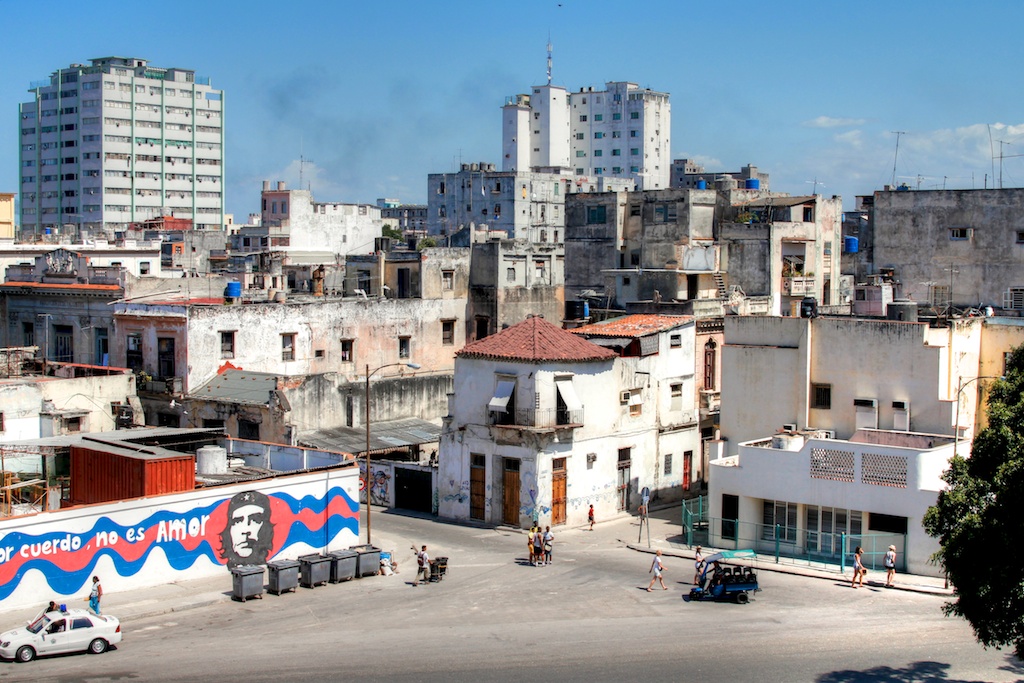
Poverty and food insecurity
The COVID-19 pandemic has exacerbated the risks of food insecurity in the Caribbean region. Increased market prices, disruptions to the global supply chain, food shortages, and loss of income are some of the challenges brought on by the pandemic in the region. Surveyed by CARICOM, respondents across the region reported feeling worried about unemployment and meeting food and other essential needs. Additionally, respondents reported increasing numbers of job loss or fear of eventual job loss, which raises concerns over levels of poverty in Caribbean countries, especially on small islands like Antigua and Barbuda. In recent months, high levels of food insecurity, largely stemming from an overreliance on imported commodities, have driven governments to rethink their agricultural models, even leading some countries, like Saint Kitts and Nevis, to promote a policy of import substitution.
Food insecurity levels have skyrocketed in both rural areas and cities like Havana, Cuba. “Cuba Havana” by @Doug88888 is licensed under CC BY-NC-SA 2.0.
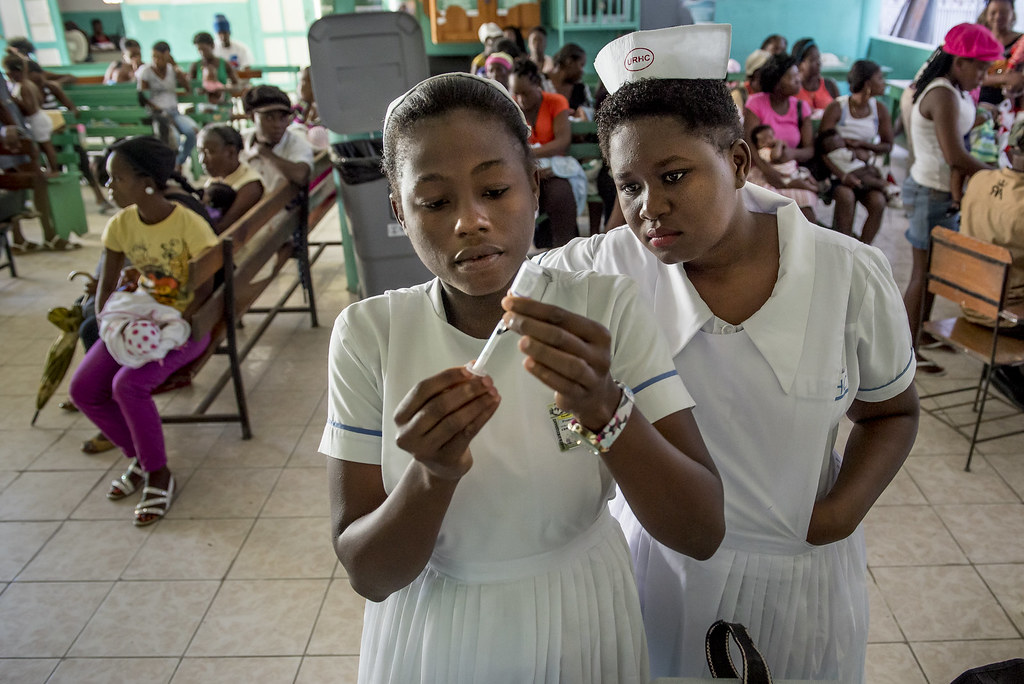
The Role of Women
In the Caribbean region, women have been severely affected by the COVID-19 pandemic. Due to their large role in their countries’ informal economies, women in island nations such as Barbados and Dominica have been greatly affected by the economic consequences of the pandemic. Compromising a large part of the vital roles in the health and social sectors, women in the Caribbean are in many cases at greater risk of exposure to COVID-19. Additionally, Caribbean countries have had to take initiatives to address domestic violence concerns amidst stay-at-home orders, with many nations promoting emergency hotlines as well as psychological services. Concerns over domestic violence have led to calls for an end to domestic and gender-based violence across the region and even a widespread protest movement for justice for victims and survivors in Trinidad and Tobago.
Two nurses work at a local clinic in Haiti. “Haiti Ward Nurses” by USAID_IMAGES is licensed under CC BY-NC 2.0.
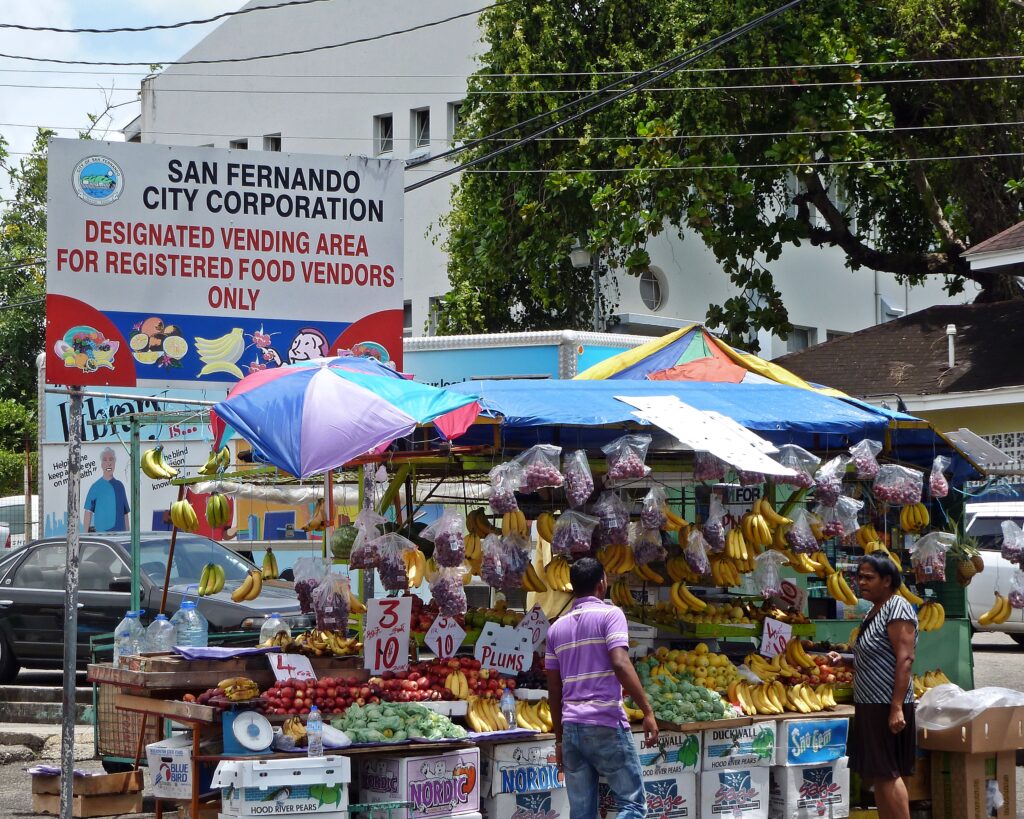
Community outreach
Despite the many challenges that have faced the Caribbean since the beginning of the COVID-19 pandemic, the people of the region have continuously shown their resilience and commitment to helping rebuild their communities. In St Kitts and Nevis, the government has finished construction on new single-family housing in Stapleton that will help over 30 families. They are also working to develop their education centers and help further educate their teachers. In Belize and Grenada, some citizens have taken it upon themselves to help struggling members of their community through donations and even small-scale gardening to combat food insecurity. Local non-governmental organizations have also played a key role in assisting vulnerable communities, through initiatives such as the creation of a digital map of organizations providing assistance to victims of domestic violence in Suriname and the distribution of care packages by volunteers in Saint Kitts and Nevis. TOCO has also played a large role in the region distributing PPE and food supply to Saint Lucia and Monserrat. These efforts demonstrate the important roles of local actors in assisting their communities during times of crisis.
Street vendors in San Fernando, Trinidad and Tobago. “File:San Fernando -Trinidad and Tobago Street Vendors.jpg” by Kalamazadkhan is licensed under CC BY-SA 4.0.
What to Watch:
Caribbean governments must continue to prepare their economies and communities for the subsequent resurgence of COVID-19 variants, as they currently deal with the Omicron variant. While the Caribbean continues to welcome an increased number of tourists, considerations of public health—specifically within tourists—must be taken seriously so as to avoid community spread and not overwhelm health infrastructures. The resurgence of community transmission in many countries following elevated levels of travel over the holiday season underscores the delicate balance between spearheading economic recovery and protecting community health. In addition to COVID-19, Caribbean governments will concurrently face the spread of other diseases like Dengue fever, necessitating further investments in healthcare and the development of clear and strict protocols to protect public health, as well as other potential threats to safety and natural disasters, like the eruption of Saint Vincent and the Grenadines’ La Soufrière volcano.
While the economic crisis brought about by COVID-19 lingers, governments will need to play an active role in providing support to those struggling financially. Many countries have expanded their Citizenship By Investment (CBI) programs to ensure that government revenues are high enough to provide essential services to citizens; revenue-bolstering measures like these could be adopted across the region.
Ensuring that all people have access to assistance throughout the pandemic will require the strengthening and revitalization of government services and programs. Similarly, as countries in the Caribbean continue administering vaccines, the creation of frameworks for the effective and equitable distribution of vaccines and the implementation of wide-reaching educational campaigns will be critical. These efforts will be key in protecting the rights of the most vulnerable across the Caribbean, especially women, children, people with disabilities, the elderly, victims of domestic violence, indigenous groups in Suriname, Haitian immigrants and stateless people in the Dominican Republic, and Venezuelan migrants in Trinidad and Tobago. The COVID-19 pandemic has underscored the importance of capacity-building in preparation for future crises and economic diversification to sustain shocks to the tourism, agriculture, energy, and natural resource sectors. In the long-term, expanded access to technology and broadband as well as a culture of innovation will help the Caribbean recover from the pandemic and create new opportunities.